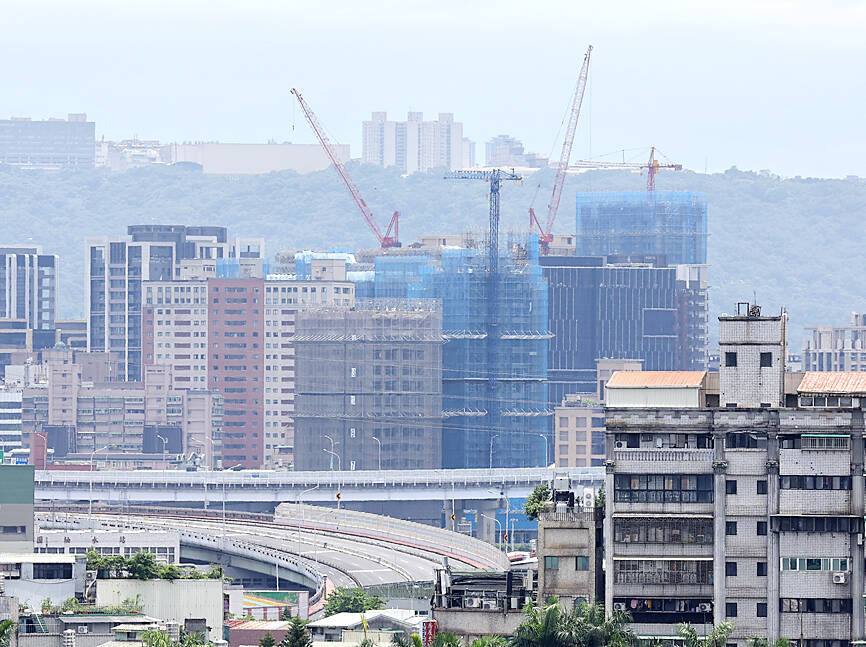Unsold presale houses totaled 47,108 units in northern Taiwan as of last month, accounting for 27.7 percent of the overall volume for sale, heaping price correction pressures on developers, a report by My Housing Monthly (住展雜誌) said on Thursday.
The upcoming ban on transfers of presale house purchase agreements, which the government is still fine-tuning to settle details such as when and how to implement it, would add difficulty to their digestion, the magazine’s research manager Chen Tsai-chi (成采錡) said.
Property transactions, including presale house contracts, tumbled 28 percent year-on-year in the first two months of this year, government data showed, as economic uncertainty and interest rates hikes drove potential buyers to the sidelines.

Photo: CNA
Many developers have opted to postpone or extend construction, giving them more time to digest inventory and ease selling pressure, Chen said.
As of last month, Taoyuan had the highest number of unsold presale houses at 18,115 units, followed by New Taipei City’s 17,520 units, the report said, adding that the number in Yilan County and Keelung were small in comparison at less than 2,000 units.
New Taipei City’s Tamsui District (淡水) had the heaviest supply at 4,013 units, concentrated mainly between Tamsui New Township (淡海新市鎮) and Hongshulin (紅樹林) MRT Station.
Fifteen districts in northern Taiwan had more than 2,000 unsold presale units — Tamsui, Sanchong (三重), Tucheng (土城), Linkou (林口), Wugu (五股) and Jhonghe (中和) in New Taipei City and Bade (八德), Lujhu (蘆竹), Dayuan (大園), Yangmei (楊梅), Jhongli (中壢) and Gueishan (龜山) in Taoyuan, it said.
Unsold presale houses in New Taipei City’s Sanchong District numbered more than 3,000, but are relatively popular due to improving infrastructure and its proximity to the capital, Chen said.
By contrast, projects in Gueishan and Jhongli districts and elsewhere in Taoyuan have been waiting for buyers for extended periods and might become the targets of price concessions given relatively heavy supply, Chen added.

CHIP RACE: Three years of overbroad export controls drove foreign competitors to pursue their own AI chips, and ‘cost US taxpayers billions of dollars,’ Nvidia said China has figured out the US strategy for allowing it to buy Nvidia Corp’s H200s and is rejecting the artificial intelligence (AI) chip in favor of domestically developed semiconductors, White House AI adviser David Sacks said, citing news reports. US President Donald Trump on Monday said that he would allow shipments of Nvidia’s H200 chips to China, part of an administration effort backed by Sacks to challenge Chinese tech champions such as Huawei Technologies Co (華為) by bringing US competition to their home market. On Friday, Sacks signaled that he was uncertain about whether that approach would work. “They’re rejecting our chips,” Sacks

NATIONAL SECURITY: Intel’s testing of ACM tools despite US government control ‘highlights egregious gaps in US technology protection policies,’ a former official said Chipmaker Intel Corp has tested chipmaking tools this year from a toolmaker with deep roots in China and two overseas units that were targeted by US sanctions, according to two sources with direct knowledge of the matter. Intel, which fended off calls for its CEO’s resignation from US President Donald Trump in August over his alleged ties to China, got the tools from ACM Research Inc, a Fremont, California-based producer of chipmaking equipment. Two of ACM’s units, based in Shanghai and South Korea, were among a number of firms barred last year from receiving US technology over claims they have

BARRIERS: Gudeng’s chairman said it was unlikely that the US could replicate Taiwan’s science parks in Arizona, given its strict immigration policies and cultural differences Gudeng Precision Industrial Co (家登), which supplies wafer pods to the world’s major semiconductor firms, yesterday said it is in no rush to set up production in the US due to high costs. The company supplies its customers through a warehouse in Arizona jointly operated by TSS Holdings Ltd (德鑫控股), a joint holding of Gudeng and 17 Taiwanese firms in the semiconductor supply chain, including specialty plastic compounds producer Nytex Composites Co (耐特) and automated material handling system supplier Symtek Automation Asia Co (迅得). While the company has long been exploring the feasibility of setting up production in the US to address

OPTION: Uber said it could provide higher pay for batch trips, if incentives for batching is not removed entirely, as the latter would force it to pass on the costs to consumers Uber Technologies Inc yesterday warned that proposed restrictions on batching orders and minimum wages could prompt a NT$20 delivery fee increase in Taiwan, as lower efficiency would drive up costs. Uber CEO Dara Khosrowshahi made the remarks yesterday during his visit to Taiwan. He is on a multileg trip to the region, which includes stops in South Korea and Japan. His visit coincided the release last month of the Ministry of Labor’s draft bill on the delivery sector, which aims to safeguard delivery workers’ rights and improve their welfare. The ministry set the minimum pay for local food delivery drivers at